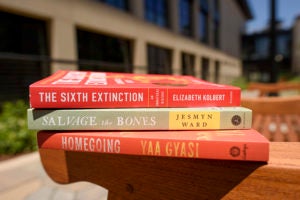Three Books program focuses on sustainability and equity
Following 13 years of tradition, Stanford’s incoming, first-year students received a special package for the summer: three books, carefully curated by a Stanford faculty member. Their assignment: read all three prior to New Student Orientation, which begins Sept. 19 and will include a panel discussion with the authors.

This year’s selections for the Three Books program were chosen by Noah Diffenbaugh, a professor of Earth system science, and center on the theme of sustainability and equity.
“In my research, I’m interested in understanding what it is about the physical climate – heat waves, drought, floods – that most impacts people and ecosystems,” said Diffenbaugh, who teaches in the School of Earth, Energy & Environmental Sciences. “Once you begin to examine the relationship between people and the environment, it becomes clear that the big global challenges for this generation lie at the intersection of sustainability and equity – the two are inextricably linked.”
Diffenbaugh selected the books Homegoing by Yaa Gyasi, BA ’11; The Sixth Extinction: An Unnatural History by Elizabeth Kolbert; and Salvage the Bones by Jesmyn Ward, BA ’99, MA ’00, a former Stegner Fellow in Stanford’s Creative Writing Program.
When Diffenbaugh was an incoming Stanford undergraduate, the Three Books program didn’t exist, but he and the other students in his dorm were assigned new student reading by their resident fellows. He still has that book, Barbara Kingsolver’s Animal Dreams, in his office.
“I definitely drew inspiration for my selections from that experience,” Diffenbaugh said. “And it happens that the author that was selected when I was an incoming student has written quite a bit about climate change and sustainability since then.”
At the heart of Diffenbaugh’s decisions regarding this year’s Three Books was the desire to encourage students to think deeply and thoughtfully about challenging issues that lack clear-cut solutions. He wanted the books to help students understand that their professors aren’t always seeking a predetermined answer to their questions. Diffenbaugh also believes the ability to work through these complicated topics will benefit students far beyond their academics.
“There are larger-scale discussions going on now, not just on campus, but nationally and internationally, and one of my goals is that our students are able to engage with those in a constructive way,” he said. “These books deal with highly charged topics where there’s no obvious solution. So, how do we have a reasoned discussion that leaves space for free speech and the free flow of ideas, where people can disagree and allow their views to evolve as a result of the dialogue? That’s an ongoing challenge, and this is an opportunity to wrestle with that experience right at the outset of college.”

